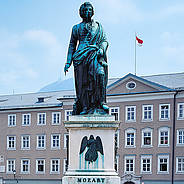
In The Steps Of Mozart
 T +43 (0)662 / 850020 | F +43 (0)662 / 850020-44 | infoairporthotel.at T +43 (0)662 / 850020
T +43 (0)662 / 850020 | F +43 (0)662 / 850020-44 | infoairporthotel.at T +43 (0)662 / 850020The Salzkammergut is a unique landscape which is characterized by crystal-clear lakes, large woods, impressive mountains, alpine meadows and soft foothills. This region owes its name to the salt extraction which dates back to the iron-age and has always brought grand wealth to this region.
The region offers popular excursions - some suggestions for a day-trip:
Bad Ischl is a lovely small town, a beautiful spa. This spa came to fame primarily during the years of Franz Josef’s reign. Emperor Franz Josef and the Empress Elisabeth (Sissi) as well as Austrian's and European's aristocracy made pilgrimages to Bad Ischl to benefit from the healing qualities of the salt water baths. Various artists, composers and writers spend their summer months in this picturesque location.
Bad Ischl’s most important attractions:
Bad Ischl’s most famous summer visitor, Emperor Franz Josef, spent around sixty summers in a Biedermeier villa situated on enormous grounds.
The marble manor was once Empress Elisabeth’s teahouse and today houses the photographic museum of the province of Upper Austria.
The museum contains historic motorbikes, cars, helicopters and even planes.
The operetta maestro composed 24 of his 30 operettas here.
The elegant ballroom which once hosted lavish parties.
The most famous coffee house in Bad Ischl. The specialities are Zauner croissants, Zauner fruitcake, Zauner wafers and Zauner Guglhupf (ring cake).
Hallstatt is a charming village with skilfully constructed houses in gothic, renaissance and baroque style. Hallstatt owes its existence to the rich salt deposit in the salt mountains.
is a climatic health resort at Lake Wolfgangsee. In the 13th, 14th and 15th century St Wolfgang was a centre of Christian pilgrimage to the memorials of St Wolfgang. In the church you find a beautiful late Gothic winged altar (1471-1481) by M. Pacher and the most important Gothic winged altar in Central Europe. The hotel 'Im Weissen Roessl' owes its fame to the operetta of the same name by Benatzky (1930).
is a lovely village at Lake Mondsee with a Benedictine Abbey founded 748, a Gothic collegiate church, an impressive pseudo-basilica church, a lake-dwelling museum, museum of local history and culture (Mondsee Abbey Culture) and 'Mondseer Rauchhaus' open air museum. Since 1929 performances of 'Mondseer Jedermann' ('Mondsee Everyman') morality play have been taking place in summer. Lake Mondsee is one of the warmest bathing lakes of the Salzkammergut region with a good water quality.
You can fly to a wide variety of
destinations from Salzburg Airport
this winter.
NEW destinations:
ALICANTE, MARRAKESH
and BEIRUT.